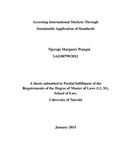| dc.description.abstract | The objective of the study was to explore whether the implementation of a comprehensive quality regulatory infrastructure would lead to the production of quality goods and services in Kenya, which would improve the country‟s competitiveness in the regional and international markets and hence lead to greater economic development for Kenya. The research design was descriptive qualitative research design. The population of the study was all the quality infrastructure institutions in Kenya. The target institutions were six. Data was collected through the analysis of various legal instruments and policies, books, journals, papers, group discussions and internet resources. The main theories guiding the study were the Law and Development theories of Neoclassical Counter Revolution and Endogenous or the New Growth Model. The study analysed the international legal regime of WTO-TBT/SPS measures, the regional regimes of the COMESA Treaty and the EAC Common Market Protocol and various local legal instruments which regulate quality in Kenya. The research found out that whereas the international and regional quality regulatory framework are in place, the quality regulatory framework in Kenya has not been updated to be in tandem with these regional and international legal régimes. Consequently the Kenyan quality regulatory system is in disarray and the various quality regulatory institutions have overlapping mandates causing bureaucracy to producers and exporters in the country. This leads to inability to access international markets by Kenyan goods and services and hence to slow economic development of the country. The study found out that Kenya as a developing country faces unique challenges in the quality regulatory infrastructure. The study therefore proposed solutions to overcoming these challenges. The study established that law is important in economic development; also that Standardization plays an important role in enhancing competitiveness of goods and services in regional and international markets; and that a harmonized and strengthened quality regulatory framework leads to an efficient and effective national quality infrastructure that supports regional and international markets. | en_US |

